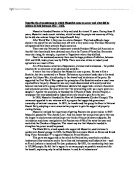One of the crucial deductions Mussolini made is that, in order to remain in power, he had to keep the support of the ones who supported his ‘seizure’ of power. He therefore tried to ease the fears of the industrial elite and allowed them to organize syndicates, separate from those of the workers. His economic policies were designed to gain their support: taxes lowered, privatization of the telephone system, price and rent controls abolished, and controversial plans to hunt down tax evaders were dropped. Finally, he appointed De Stefanni as economic minister, who appealed to the industrial elite and courted the support of Confidustria. Furthermore, the merger with the nationalists and the appointment of Federzone as Colonial Minister not only helped win over influential figures in business and armed forces, but also added the blue-shirts to the MVSN (counterweight to the ras) and increased fascist power in the south where it was weakest. Although five years earlier, he even rejected holy matrimony (!), in 1922 he decided to make clerical concessions as well, such as eradicating contraception, expressing disgust for abortion, making religious education compulsory, and introducing catholic symbolism into the schools and courts of law. In combination with the expulsion of its leader Sturzo, by the Pope, the PPI was beginning to die out and was not a threat of significance to PNF any more. Slowly and confidently, Mussolini was mollifying the indispensable agents for his ‘hover’ in power.
Consequently, many of the fascist extremists and syndicalists, including certain ras were suspicious about Mussolini’s concession and saw them as a deterrent to the ‘second fascist revolution’. This meant that they wanted Mussolini to form a dictatorship, and fast. They were however, Fascists, and so Mussolini, rather than showing brutality, appeased them by creating the Grand Fascist Council. Mussolini was the head of the Council and it solely consisted of Fascist Ras. Although it had no legal status until 1928, it undercut the functions of the Cabinet and certainly occupied the ras with (seemingly) important decision-taking. While this went on Fascist squads were disbanded and converted into the MVSN- the National Security Voluntary Militia, paid (!) and full-time. The ‘volunteers’ swore an allegiance not to the State or the King or even the Fascist Party, but to Benito Mussolini. In other words, he localized forces which heedlessly believed in Fascist ideals, and not only heightened his power of intimidation but also brought the squadristi under his control and thus weakened even more the influence of the ras.
In order to ensure an outright majority in the next parliament, and to tighten the grip over the Italian State the Fascists passed the Acerbo Law (while members of squads ‘nonchalantly’ roamed around the room). This law dramatically undermined the democracy of the state, giving the party with most votes, by decree, two thirds of the seats in parliament, and the rest distributed in accordance with proportional representation. After the introduction of the law, in the April 1924 elections, the Fascists lists won 60% of the votes, and claimed 374 of 535 seats. Whilst this was partially gained due, violence and intimidation, 2.5 million people still voted against fascism. Mussolini’s response to this was that he believed ‘50,000 guns are better than the support of 5 million voters.’ Although estimates show that not all the names on the winning lists utterly supported fascists, the 1924 elections, exacerbated by the Acerbo Law, proved to be a highly significant factor in the escalation of Fascist power.
Finally, the last significant stage was the brutal murder of the socialist leader Giacomo Matteotti, a well-known critic of Mussolini and his policies. When highly positioned fascists such as Dumini and Filipelli were implicated in the murder, there was a widespread belief that the Duce had something to do with it. Riots, unrest, and numerous fiery questions posed on the government shook Mussolini’s chair and he himself was seen ‘red-eyed and unshaven’. However, on 3 January 1925, he decided to ‘personally’ stand behind fascist action (except the murder) and craftily ask for ‘personal’ powers in order to alleviate problems. He was granted this notion due the divide within his opponents, as some decided to leave parliament with the Aventine Secession call-sign, and the King’s belief that now, more than ever, Mussolini can be controlled.
In conclusion, there were several stages through which Mussolini undermined democracy in the years 1922-1925 with most important being the assumption of emergency powers, ‘swindling’ the conservative establishment for support, appeasing the radicals by creating authoritarian bodies, utilizing the Acerbo Law, and exploiting the Matteotti crisis to his benefit thus declaring the commencement of a totalitarian regime.







